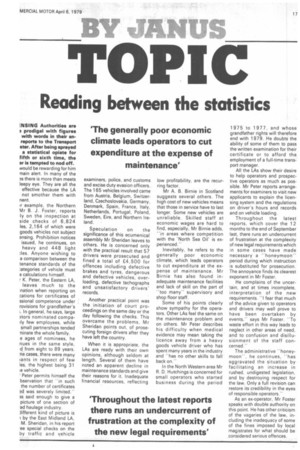Topic
Page 19

If you've noticed an error in this article please click here to report it so we can fix it.
Reading between the statistics
'The generally poor economic climate leads operators to cut expenditure at the expense of maintenance'
:NSING Authorities are 3 prodigal with figures with words in their anreports to the Transport ster. After being sprayed a statistical opiate for fifth or sixth time, the ar is tempted to nod off. would be rewarding for him main alert. In many of the as there is more than meets leepy eye. They are all the effective because the LA not smother them with nent, ir example, the Northern Mr B. J. Foster, reports ly on the inspection at side checks of 6,824 les, 2164 of which were goods vehicles not subject ensing. Prohibition notices issued, he continues, on heavy and 448 light :les. Anyone wishing to a comparison between the tenance standards of the :ategories of vehicle must calculations himself. K. Peter, the Eastern LA, leaves much to the nation when reporting on 2ations for certificates of ssional competence under revisions for grandfather's In general, he says, large 3tors nominated compaily few employees, while small partnerships tended -ninate the whole family. e ages of nominees, he nues in the same style,
.d from eight to 89 years. ne cases, there were many 'ants in respect of few les, the highest being 31 .e vehicle.
Peter permits himself the bservation that "in such the number of certificates ad was severely limited," as said enough to give a picture of one section of ad haulage industry.
lifferent kind of picture is by the East Midland LA, M. Sheridan, in his report .ee special checks on the by traffic and vehicle
examiners, police, and customs and excise duty evasion officers. The 165 vehicles involved came from Austria, Belgium, Switzerland, Czechoslovakia, Germany, Denmark, Spain, France, Italy, Netherlands, Portugal, Poland, Sweden, Eire, and Northern Ireland, Speculation on t he significance of this ecumenical assembly Mr Sheridan leaves to others. He is concerned only with the practical result that 57 drivers were prosecuted and fined a total of £4,500 for offences including defective brakes and tyres, dangerous and defective vehicles, overloading, defective tachographs and unsatisfactory drivers' records.
Another practical point was the initiation of court proceedings on the same day or the day following the checks. This overcame the problems, Mr Sheridan points out, of prosecuting foreign drivers after they have left the country.
When it is appropriate, the LAs are ready with their own opinions, although seldom at length. Several of them have noted an apparent decline in maintenance standards and give their reasons for it. Inadequate financial resources, reflecting low profitability, are the recurring factor.
Mr A. B. Birnie in Scotland suggests several others. The high cost of new vehicles means that those in service have to last longer. Some new vehicles are unreliable. Skilled staff at economic wages are hard to find, especially, Mr Birnie adds, —in areas where competition with the 'North Sea Oil' is ex.perienced."
Inevitably, he refers to the generally poor economic climate, which leads operators to cut expenditure at the expense of maintenance. Mr Birnie has also found inadequate maintenance facilities and lack of skill on the part of "too many" supervisory and shop floor staff.
Some of his points clearly show sympathy for the operators. Other LAs feel the same on the maintenance problem and on others. Mr Peter describes his difficulty when medical evidence may mean taking the licence away from a heavy goods vehicle driver who has spent many years in the industry and "has no other skills to fall back on.—
In the North Western area Mr R. D. Hutchings is concerned for small operators who started business during the period 1975 to 1977, and whose grandfather rights will therefore end with 1979. He doubts the ability of some of them to pass the written examination for their certificate or to afford the employment of a full-time transport manager.
All the LAs show their desire to help operators and prospective operators as much as possible. Mr Peter reports arrangements for examiners to visit new applicants to explain the licensing system and the regulations on driver's hours and records and on vehicle loading.
Throughout the latest reports, which cover the 12 months to the end of September last, there runs an undercurrent of frustration at the complexity of new legal requirements which in some cases have made necessary a ''honeymoon'' period during which instruction is substituted for prosecution. The annoyance finds its clearest exponent in Mr Foster.
He complains of the uncertain, and at times incomplete, interpretation of the new requirements. "I fear that much of the advice given to operators and drivers may well prove to have been overtaken by events," says Mr Foster. "To waste effort in this way leads to neglect in other areas of need, and to confusion and disillusionment of the staff concerned."
The administrative "honeymoon", he continues, —has aggravated the situation by facilitating an increase in rushed, undigested legislation, and by destroying respect for the law. Only a full revision can restore its credibility in the eyes of responsible operators.'
As an ex-operator, Mr Foster speaks with double authority on this point. He has other criticism of the vagaries of the law, including the inadequacy of some of the fines imposed by local magistrates for what should be considered serious offences.




































































































































































